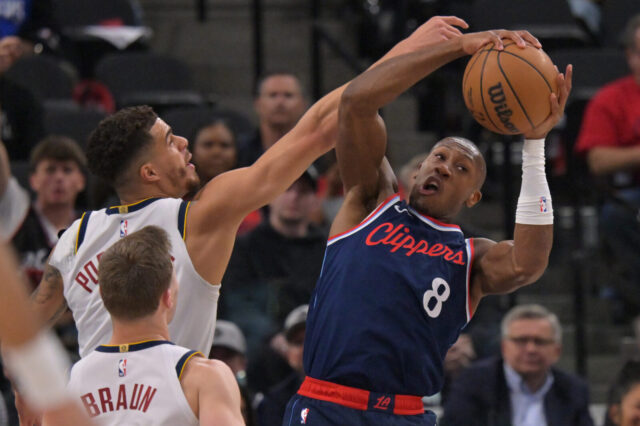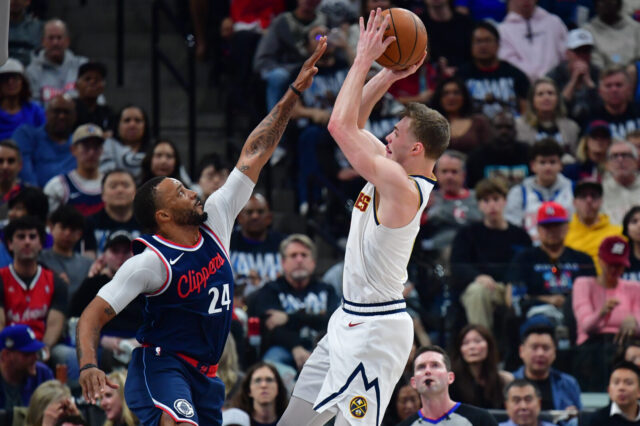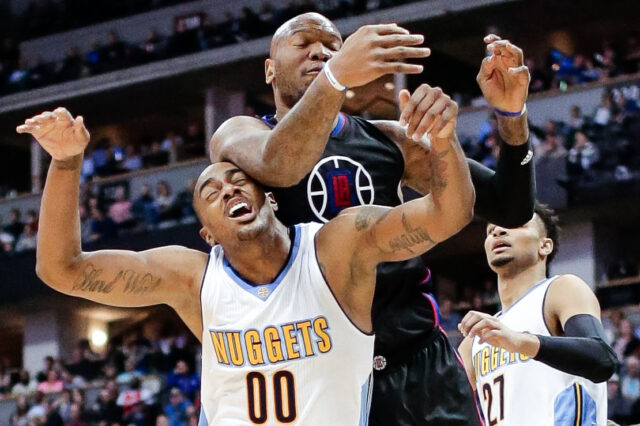This content is no longer available.
This content is no longer available.
This content is no longer available.
This content is no longer available.
I knew Nikola Jokic was capable of greatness but didn’t realize it would come so soon. Neither did the Denver Nuggets.
On a roster filled with a couple of sage veterans and mostly young whippersnappers, Jokic was quite literally the central figure to tie the organization together. For the last two years, every organizational decision the Nuggets have made has centered around the question of how to make Nikola Jokic better. While the Minnesota Timberwolves tethered Andrew Wiggins to Karl-Anthony Towns, the Philadelphia 76ers are forcing Ben Simmons to coexist with Joel Embiid, and the Utah Jazz continue to start Derrick Favors next to Rudy Gobert, the Nuggets have gone the other direction, fitting pieces around Jokic to magnify his skills. The result? A First Team All-NBA award for the Joker over those other centers.
But if you ask Jokic about awards and individual accomplishments, he will turn up his nose. As warranted as those accomplishments are, Jokic doesn’t care for them, preferring to operate from the shadows and keep his teammates happy. When asked in his exit interview what he will remember the most, he spoke of “the fun that we had winning the games. We won a lot of games.”
The primary reason for those wins: Jokic’s selfless attitude.
Foundational Passing
Every elite offense possesses something special that makes it elite. Basketball changes fluidly to reflect the key differences in star players from era to era. Before the three-point heavy era we find ourselves in today, the pace and space era centered around the Miami Heat and San Antonio Spurs title teams that possessed players to play at quicker tempo and make the right pass. Before them, the isolation era focused heavily on star players who could carry the heaviest loads offensively, from Kobe Bryant, to LeBron James, to Carmelo Anthony.
Now, Nikola Jokic is offering something new to the fabric of basketball history: the point center.
Tall ball handlers and playmakers have existed in every era of history, but through the years, they just keep getting taller. From Oscar Robertson and John Havlicek to Magic Johnson and Larry Bird to LeBron James and Draymond Green, foundational players from each era can be found among the playmakers. This is what makes Nikola Jokic so special. At 7’0, Jokic is the tallest primary playmaker in NBA history. Among all qualified centers, Jokic’s assist metrics are far and away the best mark of all-time.
This content is no longer available.
This year, Jokic took his passing to another level, improving his assists per game number from 6.1 to 7.3 in less minutes per game.
Jokic has a variety of standard passes he makes that are foundational for Denver’s offense. One such pass is the pick and roll/dribble hand off at the top of the key with Jamal Murray, as this two-man game represented Denver’s most frequent set in the postseason.
Jokic reads and reacts off of this set based on how the defense guards Murray. If they commit heavily to Murray as the ball handler, Jokic comes open for the pick and pop jumper at the top of the key.
Jokic’s comfortability hitting a jump shot at the top of the key opens up so much of his passing game. From back cuts to guards, passes to spot ups, to other DHO actions, everything stemmed from Jokic’s ability to draw his defender out of the paint.
Sometimes, Jokic looks where he passes the ball. Other times, it’s all about where he knows his teammates will be and where the defense is going.
Either way, notice how close Jokic’s defender is on both of the above plays. Even though Jokic struggled as a jump shooter during the regular season, his 39.3 percent mark from behind the arc in the playoffs reflects public perception much more accurately. Defenses are forced to extend their coverage to guard against Jokic shooting at the top of the key, and as that occurs, passing lanes open up more frequently. The result was an average of 8.4 assists per game in the playoffs, second most among centers all time behind only Wilt Chamberlain, who averaged 9.0 in 47.9 minutes per game.
Improving Scoring Profile
The best players in the NBA tend to warp the way defenses operate, as standard defense doesn’t necessarily cut it. Stephen Curry often draws multiple defenders at the three-point line leaving the paint open. Giannis Antetokounmpo forced the Toronto Raptors to build a wall in the Eastern Conference Finals, and it worked because the supporting cast couldn’t hit perimeter jumpers. Jokic operates in a similar fashion as a passer, and more often than not, it forces defenses to let him try and score in optimal situations.
This content is no longer available.
Jokic’s most common way of exploiting 1-on-1 matchups was in the post. As Jokic has grown more experienced, he has continued to add to his repertoire of post moves, including up-and-unders, fadeaway jumpers, and reverse pivots into open space. Most common though is the jump hook over the left shoulder.
While his athleticism leaves a lot to be desired, Jokic more than makes up for it by using his body effectively to carve out space around the rim. Most centers today are gearing up for the switching nature of NBA offenses. Jokic is the perfect counter for that, as he plays games at close to 270 pounds and can back down almost anybody under the rim.
When he misses his shots around the rim, don’t worry. His 9.8% Offensive Rebounding Rate in 2018-19 allowed him the opportunity to follow up on misses by himself and his teammates. And he doesn’t even need both hands.
So much of the impact Jokic has as a scorer is tied to his efficiency in and around the paint. He’s a special scorer from inside 10 feet, and his midrange jumper helps keep defenses honest as well. While Jokic ranked just 22nd out of 37 players in field goal efficiency in the restricted area (0 to 3 feet) at 69.6% (min. 350 FGAs) the majority of Jokic’s attempts from that distance are unassisted. Jokic generates his own shot, either using post moves, isolations, or offensive rebounds, at over 60% frequency, putting him in the category of ball handlers like Eric Bledsoe, LeBron James, and Giannis Antetokounmpo.
From floater range (3 to 10 feet) Jokic displays immense touch abnormal for a center. Only Jonas Valanciunas, Nikola Vucevic, Robin Lopez, and Serge Ibaka possessed a higher efficiency in that range among all NBA players. While both Valanciunas and Lopez created shots for themselves, Jokic created nearly 50% of his looks from that distance, maintaining poise and hitting some impressive shots.
In addition to his standard play types, Jokic expanded his game to isolations and pick and rolls as the ball handler. The pick and roll sets were interesting as they generally involved a screen set by Jamal Murray. That tandem was extremely efficient and found ways to surprise the defense with different wrinkles and reactions.
As Jokic continues to develop his game and transition into full-time superstar, taking advantage of Jokic’s unique skill set is key. He’s not an elite scorer by any stretch, but Jokic found ways to be highly impactful in the playoffs as strictly a scorer when shooters around him struggled to hit shots. He averaged 25 points per game for a reason, and while I never think he will average that amount across a full season, he could approach that number by simply leaning into the weird. No center in the NBA inverts the offense the way he can, and generating switches, using his body, and consistently finishing with touch should allow him to maximize scoring output.
The best season in Nuggets history?
The Nuggets had arguably their best season in franchise history. Without a Finals appearance to speak of, every season can be subjectively better than the other. This year, Denver’s collection of young players guided by a couple of sage vets and Nikola Jokic did something special. They massively outperformed expectations and proved they deserve to be talked about as a contender in the near future.
But individually, Nikola Jokic had the best season in Nuggets franchise history.
Former Nuggets have averaged more points, more rebounds, and more assists before, but never has a player provided such a widespread impact while representing this franchise.
This content is no longer available.
Only point guards ever appeared in the top 15 in assists in Nuggets history. Guys like Fat Lever, Andre Miller, Nick Van Exel, and Ty Lawson. Jokic is the leader in assists in Nuggets franchise history through the first four years of a career. Jokic matched that passing excellence with solid numbers all over the floor, and he’s already knocking on the door of all-time numbers across the board.
Where things really take a higher turn is the advanced metrics.
This content is no longer available.
Jokic put up three best-in-franchise-history metrics this past year: Player Efficiency Rating, Box Plus-Minus, and Value Over Replacement Player. In addition, he was second in single season win shares behind only David Thompson in 1978. These metrics are designed to grade a player’s all around contributions, and nobody plays the all-around game like Jokic.
The Nuggets asked Jokic to do everything this year. He was their primary creator during games. He was the closer when the team needed a bucket. He anchored the team when they needed consistency and gave them a special performance when they needed that too. Without Jokic’s heroics, the Nuggets might not be a playoff team, let alone a team one game away from going to the Western Conference Finals.
The question is, can Joker take his game to the next level?
Jokic established himself as one of the best players in the NBA today. He’s not quite on the tier of the top guys in LeBron James, Stephen Curry, Kevin Durant, Giannis Antetokounmpo, James Harden, and Kawhi Leonard, but the next tier down is a solid place to be. He proved in the playoffs he was the best player in a series involving Damian Lillard. He didn’t falter in the same ways that Joel Embiid and (an injured) Paul George did. Russell Westbrook? Not even close.
There are a few ways that Jokic can jump into that next tier of superstar players, but they mostly involve improvement on the margins. Jokic has done the hard work of filling up the stat sheet and contributing to a winning cause. The more efficient he can be as a shooter and playmaker (more opportunities for others compared to less turnovers) the better he will become. In addition, working on his body to be a better defender will always help. It’s unknown whether Jokic can contribute at an MVP level against the Golden State Warriors and Houston Rockets. Getting faster and stronger will only help Jokic’s cause in that regard.
But that’s a question to worry about for another day. Right now, it’s vindication for Nuggets faithful. Nikola Jokic is a legitimate star. He went above and beyond in proving that in every situation. Does he have flaws? Sure. He wouldn’t be the perfect superstar for the city of Denver to rally behind if he didn’t.


